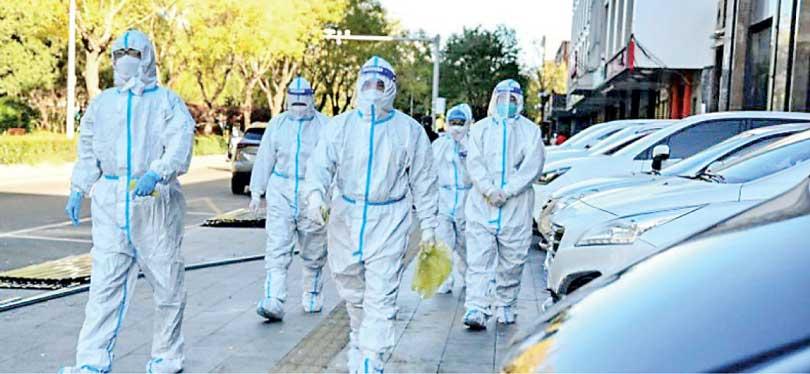03 Jan 2023 - {{hitsCtrl.values.hits}}

A photo clicked in November 2022 showing health workers near a residential area under lockdown due to Covid-19 coronavirus restrictions in Beijing. (AFP)
 It took a few days of unprecedented mass protests, the largest since the Tiananmen demonstrations in 1989, for the Chinese authorities to ditch the rigid zero covid policies that were, needlessly, in force for nearly three years. However, the abrupt opening of China, and worst still, the lack of reliable official 9data on the fresh covid wave, which is now ravaging the mainland, has sent shivers across the world, forcing the countries to bring back covid restrictions. India, Japan, the United States, Australia, Canada and many others now require a negative covid test not older than two days from the arrivals from China.
It took a few days of unprecedented mass protests, the largest since the Tiananmen demonstrations in 1989, for the Chinese authorities to ditch the rigid zero covid policies that were, needlessly, in force for nearly three years. However, the abrupt opening of China, and worst still, the lack of reliable official 9data on the fresh covid wave, which is now ravaging the mainland, has sent shivers across the world, forcing the countries to bring back covid restrictions. India, Japan, the United States, Australia, Canada and many others now require a negative covid test not older than two days from the arrivals from China.
On the extreme end, Morocco has banned all visitors from China. Others, for instance, Italy and Taiwan, have opted for PCR tests at the airport on the arrivals from the mainland.
present, there are likely to be over one million cases and over 5,000 deaths daily in China. This is in stark contrast to the official data, which reported 1,800 cases
China has stopped publishing daily COVID-19 data has not helped elicit confidence. China’s official data counts record daily infections as low as 5000 while hospitals are overwhelmed, funeral houses are running around the clock, and anti-viral are in short supply.
Earlier, the WHO asked Chinese officials to share real-time COVID-19 data, including information on genetic sequencing, hospitalizations, and death count.
China has also narrowed its definition COVID-19 related death, limiting it to pneumonia and respiratory failure in patients with the virus. The new measure omits the fatalities caused by other underline causes and runs counter to the WHO guidelines adopted by most countries. According to official Chinese data, there were only seven covid deaths during the first three weeks of December.
Dark clouds
However, modelling by international agencies predicts a gloomy outlook. Airfinity, a UK-based forecasting firm, has forecasted China to see two peaks in cases as COVID-19 spreads throughout the country, the first in mid-January and the second in early March. Its model estimates to case numbers to reach 3.7 million a day in a January peak and 4.2 million a day in March 2023.
It suggests that, at present, there are likely to be over one million cases and over 5,000 deaths daily in China. This is in stark contrast to the official data, which reported 1,800 cases and only seven official deaths over the past week.
According to another projection from the US based Institute of Health Metrics and Evaluation (IHME), China’s fresh covid wave could kill as many as 1 million people in 2023.
Chinese officials have downplayed the situation, accusing the western media of being ‘full of prejudice and political manipulation’.
 However, what alarms the epidemiologists most is that the rapid spread of COVID-19 among the vast population of China could result in the virus mutating into new variants. Some such variants could be resistant to the vaccines or more dangerous than the currently dominant omicron variant, which is rapidly transmittable but less fatal.
However, what alarms the epidemiologists most is that the rapid spread of COVID-19 among the vast population of China could result in the virus mutating into new variants. Some such variants could be resistant to the vaccines or more dangerous than the currently dominant omicron variant, which is rapidly transmittable but less fatal.
Dollars vs lives
Next week (January 8), China will resume outbound travel of Chinese nationals. China is the world’s largest outbound tourist market, and the resumption of Chinese tourism should relieve the battered global tourism market. However, economic incentives may compel some countries, especially those heavily dependent on tourism revenue and those suffering from foreign currency crunch, to overlook the necessary health precautions. Worst still, these are also the least prepared for a fresh wave of covid. Sri Lanka is one such example.
Sri Lankan health officials have not announced the covid related requirements from the Chinese arrivals, though the health ministry is expected to announce new health guidelines soon.
In December, Sri Lanka scrapped the requirement for COVID-19 vaccination certificates and pre-departure COVID-19 tests from visitors. Now, the fresh wave of cases in China should prompt the government to introduce at least basic preventive measures. The fear of antagonizing China, which may consider targeted measures on the arrivals from China as an affront, may even compel the government to introduce blanket measures aimed at all visitors. That would be a mistake and discourage visitors from low-risk destinations. Interestingly, visitors to China under the newly relaxed regulations would still need to produce a negative PCR test. The appropriate course of action would be for the government to follow the screening requirements set by other countries, i.e. a negative covid test taken before the departure. It should shun any appearance of being part of a potential geopolitical gambit into which the situation could degenerate. Though China had locked foreigners out for nearly three years under its zero covid policies, the mandarins in Beijing are now feeling offended by the countries requiring covid screening from the arrivals from the mainland.
At the same time, Sri Lanka should step up genetic sequencing for new variants. Though the sense of urgency for genetic sequencing declined recently as the risk of covid faded, the fresh challenges should call for a new sense of urgency on the part of the health ministry officials. Some countries, such as Malaysia and Italy, are now screening even waste water from aeroplanes from China for genetic sequencing of new variants.
Last but not least, if the gloomy predictions of China’s covid modelling come true- IHME’s modelling of Covid figures in 2020/21 proved to be precise – it is unlikely that any country could escape unhurt. Covid anywhere is covid everywhere. Sri Lanka should plan for such an eventuality; it should stock up on anti-viral and provide vaccine boosting for the elderly and the most vulnerable.
Since the last Covid jab was given almost a year ago, how much protection the Sri Lankans would have against a fresh wave of covid is also a question.
The last thing the cash-strapped country needs is another wave of the pandemic. Avoiding that should be the government’s priority.
Follow @RangaJayasuriya on Twitter
04 May 2024 2 minute ago
04 May 2024 55 minute ago
04 May 2024 1 hours ago
04 May 2024 1 hours ago
04 May 2024 2 hours ago